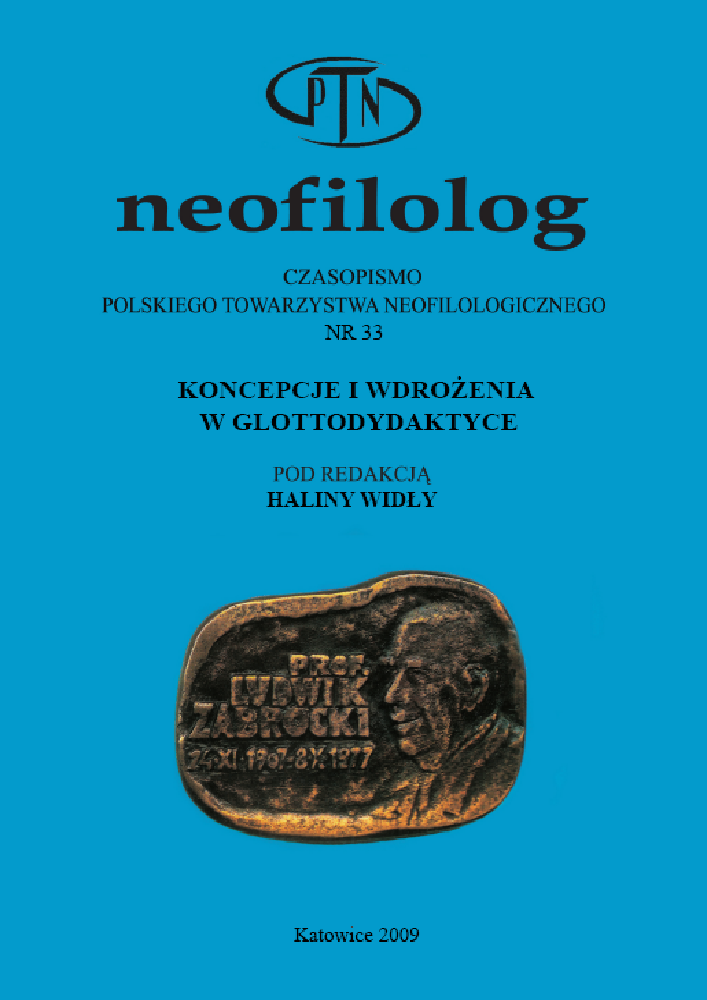Abstract
The article discusses task-based learning (TBL) in Spanish: enfoque por tareas, which is a teaching approach whose aim is to develop the learner’s communicative competence as well as to help the teacher activate language learners in the classroom – in this case learners of Spanish. The article describes the main objectives of the task and projects defined in the Common European Framework, including the proposed activities designed to fulfill a given task. The final section presents a sample set of lessons following TBL and analyzes the advantages and disadvantages of this approach.
References
Alonso-Cortés Fradejas Mª D. 2003. <> (w) Medios de comunicación y enseñanza del español como lengua extranjera. Actas del XIV Congreso Internacional de ASELE (red. H. Perdiguero, A. Alvarez). Burgos: Universidad de Burgos: 110 – 128.
Arias García, B. 2005. <> (w) La competencia pragmática en la enseñanza del español como lengua extranjera. Actas del XVI Congreso Internacional de ASELE (red. A. Alvarez i inni). Oviedo: Universidad de Oviedo: 150 – 158.
Council of Europe. 2003. Europejski system opisu kształcenia językowego: uczenie się, nauczanie, ocenianie. Warszawa: Wydawnictwo Centralnego Ośrodka Doskonalenia Nauczycieli.
Doughty, C., Williams, J. 1998. <> (w) Focus on Form in Classroom Second Language Acquisition (red. C. Doughty, J. Williams). Cambridge: Cambridge University Press:197 – 263.
Ellis, R. 2003. Task-based Language Learning and Teaching, Oxford: Oxford University Press.
Erlam, R. 2003. <> (w) Modern Language Journal 87: 242 – 260.
Fernández, S. i inni. 2001. Tareas y proyectos en clase, Madrid: Edinumen.
Gutiérrez Araus, M. L.1998. <> (w) Español como lengua extranjera: enfoque comunicativo y gramática. Actas del IX Congreso Internacional de ASELE (red. T. Juliá Jiménez i inni). Santiago de Compostela: Universidad de Santiago de Compostela: 111 – 117.
Johnson, K. 2003. Designing language teaching tasks. Basingstoke: Palgrave Macmillan.
Long, M. 1985. << The Design of Classroom Second Language Acquisition: towards Task-based Language Teaching>>, (w): Modelling and assessing second language acquisition (red. Hyltenstam K., Pienemann, M. London: Multilingual Matters: 77 – 99.
Long, M. 2003. <> (w): Español para Fines Específicos. Actas del II Congreso Internacional de Español para Fines Específicos (red. K. Jauregi i inni). Amsterdam: Ministerio de Educacion y Ciencia del Reino de España: 15 – 40.
Martín Peris, E., Sans Baulenas, N. 2004. Gente 2, Difusión, Barcelona.
Nunan, D.1989. Designing Task for the Communicative Classroom, Cambridge: Cambridge University Press.
Takimoto, M.2008. <> (w): Modern Language Journal 92: 369 – 386.
Van den Branden, K. i inni. 2006. Task-based Language Education: From Theory To Practice, Cambridge: Cambridge University Press.
Willis, J. 1996. A Framework for Task-Based Learning, Harlow: Longmann.
Willis, D. i Willis, J. 2007. Doing Task-based teaching. Oxford: Oxford University Press. Thornbury, S. 2001. How to teach grammar. Harlow: Perason Education.
Zañon, J.1999. <> (w) La enseñanza del español mediante tareas (red. J. Zañon ), Edinumen: Madrid: 13 – 25.
License
Copyright (c) 1970 Małgorzata Spychała

This work is licensed under a Creative Commons Attribution-NoDerivatives 4.0 International License.
Authors
Authors of texts accepted for publication in Neofilolog are required to complete, sign and return to the Editorial team’s office the Agreement for granting a royalty-free license to works with a commitment to grant a CC sub-license.
Under the agreement, the authors of the texts published in Neofilolog grant Adam Mickiewicz University in Poznań a non-exclusive, royalty-free license and authorize the use of Attribution-NoDerivatives 4.0 International (CC BY-ND 4.0) Creative Commons sub-license.
The authors retain the right to the free disposal of the work.
Users
Interested Internet users are entitled to use works that have been published in Neofilolog since 2017, under the following conditions:
▪ attribution – obligation to provide, together with the distributed work, information about the authorship, title, source (link to the original work, DOI) and the license itself.
▪ no derivatives – the work must be preserved in its original form. Without the author's consent, it is not possible to distribute the modified work in the form of translations, publications, etc.
Copyrights are reserved for all texts published since 2017.
Miscellaneous
Adam Mickiewicz University in Poznań retains the property right as a whole (layout, graphic form, title, cover design, logo etc.).
